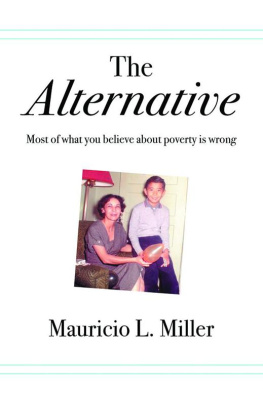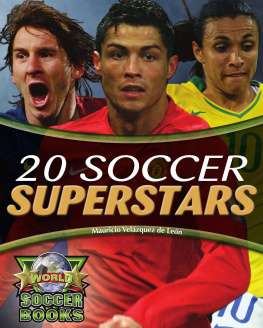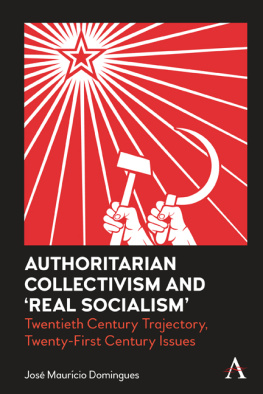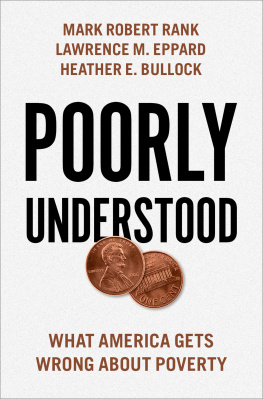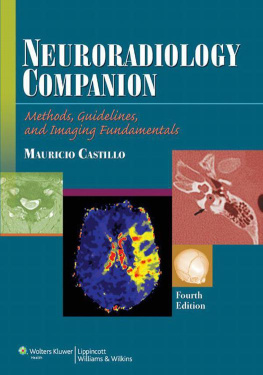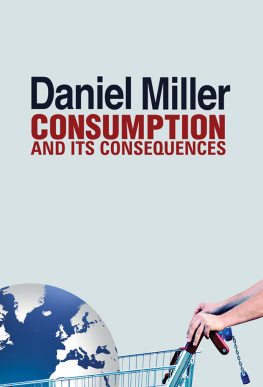Mauricio L. Miller - The Alternative: Most of What You Believe About Poverty Is Wrong
Here you can read online Mauricio L. Miller - The Alternative: Most of What You Believe About Poverty Is Wrong full text of the book (entire story) in english for free. Download pdf and epub, get meaning, cover and reviews about this ebook. year: 2017, publisher: Lulu Publishing Services, genre: Home and family. Description of the work, (preface) as well as reviews are available. Best literature library LitArk.com created for fans of good reading and offers a wide selection of genres:
Romance novel
Science fiction
Adventure
Detective
Science
History
Home and family
Prose
Art
Politics
Computer
Non-fiction
Religion
Business
Children
Humor
Choose a favorite category and find really read worthwhile books. Enjoy immersion in the world of imagination, feel the emotions of the characters or learn something new for yourself, make an fascinating discovery.
- Book:The Alternative: Most of What You Believe About Poverty Is Wrong
- Author:
- Publisher:Lulu Publishing Services
- Genre:
- Year:2017
- Rating:5 / 5
- Favourites:Add to favourites
- Your mark:
- 100
- 1
- 2
- 3
- 4
- 5
The Alternative: Most of What You Believe About Poverty Is Wrong: summary, description and annotation
We offer to read an annotation, description, summary or preface (depends on what the author of the book "The Alternative: Most of What You Believe About Poverty Is Wrong" wrote himself). If you haven't found the necessary information about the book — write in the comments, we will try to find it.
The Alternative: Most of What You Believe About Poverty Is Wrong — read online for free the complete book (whole text) full work
Below is the text of the book, divided by pages. System saving the place of the last page read, allows you to conveniently read the book "The Alternative: Most of What You Believe About Poverty Is Wrong" online for free, without having to search again every time where you left off. Put a bookmark, and you can go to the page where you finished reading at any time.
Font size:
Interval:
Bookmark:
THE ALTERNATIVE
Most of what you believe about poverty is wrong
Mauricio L. Miller
Copyright 2017 Mauricio L. Miller.
All rights reserved. No part of this book may be reproduced, stored, or transmitted by any meanswhether auditory, graphic, mechanical, or electronicwithout written permission of the author, except in the case of brief excerpts used in critical articles and reviews. Unauthorized reproduction of any part of this work is illegal and is punishable by law.
ISBN: 978-1-4834-7225-6 (sc)
ISBN: 978-1-4834-7226-3 (hc)
ISBN: 978-1-4834-7224-9 (e)
Library of Congress Control Number: 2017910152
Because of the dynamic nature of the Internet, any web addresses or links contained in this book may have changed since publication and may no longer be valid. The views expressed in this work are solely those of the author and do not necessarily reflect the views of the publisher, and the publisher hereby disclaims any responsibility for them.
Any people depicted in stock imagery provided by Thinkstock are models, and such images are being used for illustrative purposes only.
Certain stock imagery Thinkstock.
Artist Credit: Nicholas Lim
Lulu Publishing Services rev. date: 7/14/2017
To my mother, Berta
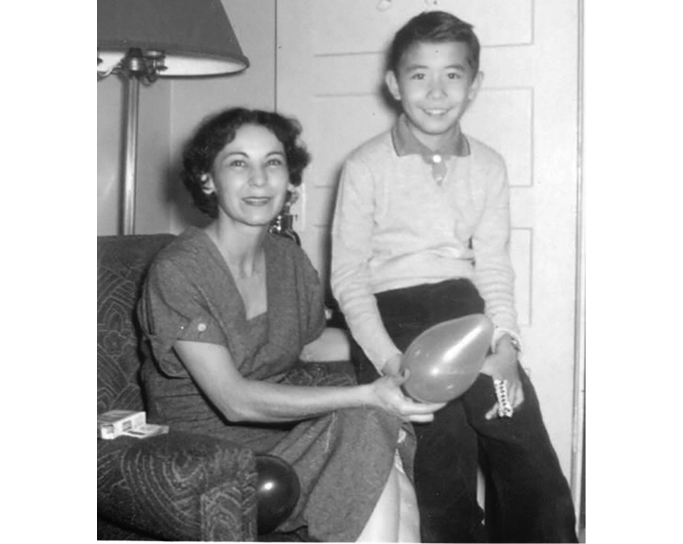
How Most People Saw Her | How She Should Have Been Seen |
Mexican immigrant | Learned math & bookkeeping on her own |
Underemployed | Worked two jobs and did side work |
Single mom | Talented dress designer and seamstress |
Twice divorced | Became a U.S. citizen |
rd Grade Education | Put her son thru UC Berkeley, engineering |
Daughter in trouble | Assured daughter was cared for by her son |
CONTENTS
INTRODUCTION
Disrupting the deficit view
SECTION I
A Fundamentally Flawed
Social Service System
SECTION II
The Alternative
Put families in the drivers seat
INTRODUCTION
Disrupting the deficit view
Berta only attended school through the third grade. In the Mexico of her era that was not rare. When two divorces left her ostracized by many in her small Catholic town of Nogales, Mexico, she was left with two young children, no money, and no marketable skills. Seeking a fresh start, she immigrated to the U.S. where her daughter became a teen mother at the age of sixteen. The mounting stress of this life taxed her health, leaving her with bleeding ulcers among other maladies.
Hearing this story of Bertas life you may feel sorry for her but conclude, nonetheless, that her troubles were ultimately the result of poor decisions. In national conversations those at one end of the political spectrum would argue that her story is another example of why we need to stop Mexican immigrants from coming to the U.S.; the other side might view her as a victim in need of help from the professional social service sector. Both of these viewpoints exemplify the prevailing deficit view of most families that cycle in and out of poverty.
So what is the reality of Bertas story? Like the vast majority of the working poor she was smart, creative, and amazingly determined. She was self-taught in math and English and enlisted a friend to teach her bookkeeping so she could get a job. A great seamstress with a natural talent for design she envisioned and made dresses to make money on the side. Determined to make a better life for her children she saved enough to find the fastest growing city in California, and moved there. She put her kids into good schools, worked two jobs, and saved to get her son into and through U.C. Berkeley as an engineer. Yes, there was drama and trauma but, my God, this woman, my mother, was to be admired and trusted, not pitied.
She wanted to be recognized for her talents and hard work. Dont we all? My mother left Mexico because she believed that hard work and talent was rewarded in the United States. She wasnt looking for charity. Yet once here she discovered she was viewed in a stereotypical way that limited her potential. She had expected to encounter those who were racist and sexist, those who would try to put her down. What surprised her is that even those who wanted to be helpful classified her as a charity case, distrusting her decisions, even those as a parent. As was also true for her friends, my mothers pride would not accept being labeled a charity case.
This book provides a glimpse of how those who wash our dishes, pick our food, and guard our buildings, see themselves. And it proposes how recognizing peoples resourcefulness, rather than their deficits, can lead to an alternative system of investment in their lives that expands our economy and builds a stronger tomorrow for everyone.
The alternative is not a program so it is important to understand that the program described here, the Family Independence Initiative, FII, was set up primarily to demonstrate that disempowering programs, so that families can lead their own change, will actually lead to better outcomes. FII has been called the un-program since it provides no services. I also have to acknowledge that while most of the critiques here are aimed at the social service sector, they are not meant to bolster the right wingers or racists. Instead this is a challenge to those that want to bring about a fundamental change to current social service approaches. Those who want to take on the mantle of closing the income and wealth gap must disrupt current practices that are based on looking for peoples weaknesses and instead invest directly in low-income families, based on their initiative.
In letter to other pastors, while in the Birmingham jail, Martin Luther King, Jr. wrote:
I have almost reached the regrettable conclusion that the Negros great stumbling block in his stride toward freedom is not the White Citizens Counciler or the Ku Klux Klanner, but the white moderate. Noting their paternalism, he continued, Shallow understanding from people of good will is more frustrating than absolute misunderstanding from people of ill.
Today most poverty experts, of any color, have a very shallow understanding of life in poverty and they promote a view of families like mine as somehow deficient. These experts highlight only the data or stories that backs a deficit view of low-income families.
Our helping system for the poor is based on charity, on well-meaning outsiders saving the poor. But the stories, data, and research presented here shows that charity slows progress. It is actually a barrier to its own mission. A focus on weaknesses hides talent and potential. There are embedded solutions and leaders in the very communities these experts seek to help. If, instead, they focused on the strengths of low-income families we would all see they are important contributors to society and as such we should invest in their talents, much as our society invests in the rich.
My story, like that of the other families I will present here, illustrates the complexity faced by those living at the bottom of our economy, as well as the resourcefulness these families display. These are stories not of exceptional families, but altogether typical ones. Census studies, that will be cited in chapter two, have continually showed that only around 3 percent, not 15 percent, of our population stays in poverty for more than a few years, with an average stay of only six months as people find work again after each layoff or cut in hours. We simply dont have a large, stagnant, underclass that needs to be saved or deserves to be called lazy. Most of what our society believes about poverty is wrong .
Next pageFont size:
Interval:
Bookmark:
Similar books «The Alternative: Most of What You Believe About Poverty Is Wrong»
Look at similar books to The Alternative: Most of What You Believe About Poverty Is Wrong. We have selected literature similar in name and meaning in the hope of providing readers with more options to find new, interesting, not yet read works.
Discussion, reviews of the book The Alternative: Most of What You Believe About Poverty Is Wrong and just readers' own opinions. Leave your comments, write what you think about the work, its meaning or the main characters. Specify what exactly you liked and what you didn't like, and why you think so.

